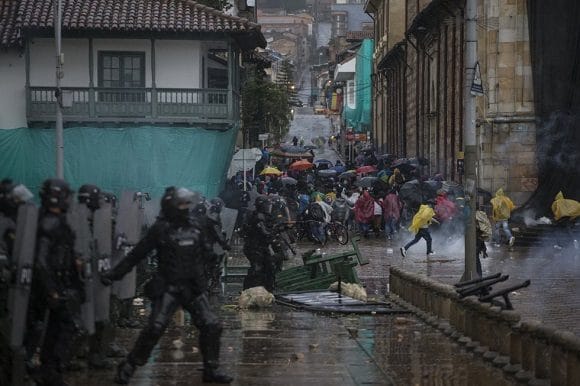Gustavo Petro: ‘The End of the Neoliberal Model in Colombia is Coming’


Orinoco Tribune – News and opinion pieces about Venezuela and beyond
From Venezuela and made by Venezuelan Chavistas

The former mayor of Bogotá and candidate for president, Gustavo Petro, analyzed the political and social crisis that Colombia is going through, where at least 379 have disappeared, and at least 20 deaths have been recorded, following more than nine days of protests against the government of Iván Duque. He denounced the transformation of young urban protesters into “military targets.”
Petro assured Colombians that “the end of the neoliberal model in Colombia is coming” while indicating that “the public policies of Duque have exhausted the patience of Colombian society.”
The candidate for the presidency of Colombia reflected on the reasons that led to the social outbreak in the country and the resulting scenes of repression, deaths and missing persons. “The public policies of Iván Duque have exhausted the patience of Colombian society across almost all its strata,” said Petro. “A deeply neoliberal model, that only survives by extracting oil and coal, is coming to an end.”
“This leads them to under-finance the State and to go into debt to save the profits for the financial system, so people fall into extreme poverty, especially in big cities like Bogotá, which has a million poor people,” explained the leader in conversation with Radio La Pizarra, broadcast on AM750. “When the tax reform arrived with taxes on food and taxes on those who work, the situation exploded.”

Along the same lines, he specified that “there was the first phase of popular mobilization that defeated the government project,” and “then came a second phase with barbaric repression and the transformation of young urban protesters into military targets.”
“It is an electoral strategy that does not take into account the young men they are murdering,” said Petro. “The objective is to terrorize the people who had expressed the intention to vote for me, to lock them in their homes so they can survive in the midst of a battlefield.”
RELATED CONTENT: Colombia: 12 Wounded in Shooting Targeting Indigenous Minga
In that sense, he drew a parallel with the government of former President Álvaro Uribe, who promoted Duque’s candidacy in the last elections. “Uribe’s strategy was always to use people’s fear to obtain votes, he did it in the times of the FARC and he wants to reproduce it now: fear leads to voting for the extreme right,” he stressed.
Electoral scenario
At another point in the interview, the presidential candidate referred to the 2022 elections: “The last poll gave me 40% of the electorate in the first round and in a second round I beat all the candidates. Today, according to that survey, the president of Colombia would be me.”
“This unleashes great fear in the government because Uribismo would be in third place, which is why they came to the conclusion that dramatic actions are necessary to win back the electorate,” he commented.
RELATED CONTENT: Colombia: Duque’s Meeting with National Strike Committee Ends with No Agreement
Faced with this scenario, Petro spoke about the electoral strategies to be deployed by former President Uribe and considered that “a hardline option would be a coup, preventing elections next year,” since “this scenario of anxiety would allow a State of Internal Disturbance, because the current military and police leadership is deeply Uribista.”
“The man who has power in Colombia today is called Álvaro Uribe Vélez,” said Petro. “Sacrificing Duque is not a problem for them but the international scene intimidates them. Another scenario is that a passive core population votes for the hard right out of fear.”
Regarding the electoral challenges for next year, Petro established that “obtaining an electoral majority has two paths: to go deeper into the popular, where it is in competition with the Uribismo that is building a neo-clientist system with public money around the anti-COVID policy… They lost the support of the Popular Communes of Medellín, which were always Uribistas via terror. There the mobilizations are immense, it is an exciting fact for those who know Colombia, a popular society freeing itself from the mafias.”
And on the other hand, he pointed out that “the other area in dispute is the middle class,” where “the liberals are stronger—they were the ones who gave Duque his victory,” which is why “today a progressive-liberalism alliance would mean a victory in the first round.”
Petro also highlighted the “good relationship with progressivism within the [Center] Democratic Party” which “allows a dialogue with the government,” and distinguished it from “the hardline nuclei that want to maintain their businesses, and do not see me favorably.”
Featured image: Gustavo Petro, former mayor of Bogotá. Photo: Caracol Radio.
Translation: Walter Lippmann for CubaNews, Orinoco Tribune
SL